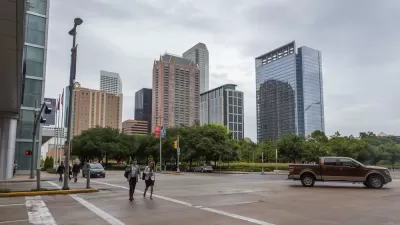Houston is famous in planning circles for lacking a zoning code, but that doesn't mean planners don't have plenty of tools to determine the future of the city.

William Fulton details the realities of land use in Houston, or, as Fulton describes it, "the largest city in the country with no zoning."
Houston is the fourth-largest city in America, with a population of 2.3 million people spread across more than 600 square miles. It contains some of the densest job centers and ritziest residential neighborhoods in the country. Yet three times in the last century — most recently in 1993 — Houstonians have voted down that most elemental of planning policies, zoning based on use. It's the first thing any planner — indeed, almost any person — asks about when they ask about Houston.
The key distinction Fulton teases out here, is that just because there is no zoning, doesn't mean there is also no planning in Houston. Houston has a frustrating development code, according to Fulton—and even zoning, in its own unique way.
"In reality, Houston is a big mixture of ordinances, policies, tactics by neighborhoods, and independent efforts by nonprofits, all of which play a role in determining how land is used," explains Fulton. "The city is rife with plans, strategies, and other efforts to create more walkability, bring new investment into historically underserved communities, and protect the city against future flooding and other hazards."
Fulton pinpoints planning in Houston to three key efforts, each with a lot more detail provided in the source article: 1) planning for the public realm, 2) planning tools for zoning workarounds, and 3) a market-driven development code.
FULL STORY: The 'Z' Word

Planetizen Federal Action Tracker
A weekly monitor of how Trump’s orders and actions are impacting planners and planning in America.

San Francisco's School District Spent $105M To Build Affordable Housing for Teachers — And That's Just the Beginning
SFUSD joins a growing list of school districts using their land holdings to address housing affordability challenges faced by their own employees.

The Tiny, Adorable $7,000 Car Turning Japan Onto EVs
The single seat Mibot charges from a regular plug as quickly as an iPad, and is about half the price of an average EV.

Seattle's Plan for Adopting Driverless Cars
Equity, safety, accessibility and affordability are front of mind as the city prepares for robotaxis and other autonomous vehicles.

As Trump Phases Out FEMA, Is It Time to Flee the Floodplains?
With less federal funding available for disaster relief efforts, the need to relocate at-risk communities is more urgent than ever.

With Protected Lanes, 460% More People Commute by Bike
For those needing more ammo, more data proving what we already knew is here.
Urban Design for Planners 1: Software Tools
This six-course series explores essential urban design concepts using open source software and equips planners with the tools they need to participate fully in the urban design process.
Planning for Universal Design
Learn the tools for implementing Universal Design in planning regulations.
Smith Gee Studio
City of Charlotte
City of Camden Redevelopment Agency
City of Astoria
Transportation Research & Education Center (TREC) at Portland State University
US High Speed Rail Association
City of Camden Redevelopment Agency
Municipality of Princeton (NJ)





























